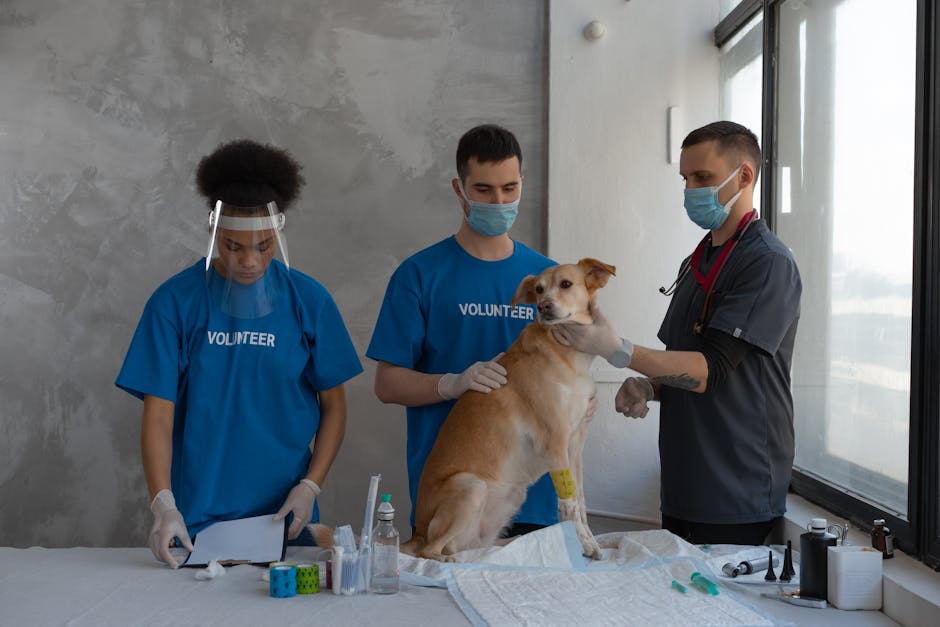Early Disease Detection is Paramount. Many diseases, particularly cancers and organ dysfunction, often manifest with subtle symptoms initially, easily overlooked by even attentive owners. A comprehensive veterinary examination, however, can uncover these nascent problems long before they become debilitating. Through palpation, auscultation (listening to the heart and lungs), and laboratory tests (blood work, urinalysis), veterinarians can identify anomalies indicating a developing health issue, allowing for early intervention and improved treatment outcomes. Early detection dramatically increases the chances of successful treatment and often translates to less invasive and less expensive procedures. For instance, detecting kidney disease in its early stages allows for dietary and lifestyle modifications that can slow its progression significantly, compared to managing the disease in its advanced stages.
Vaccination Protects Against Deadly Diseases. Vaccinations are a cornerstone of preventive care, shielding pets from various life-threatening infectious diseases. These diseases, like canine parvovirus, feline leukemia virus, and rabies, can be devastating and even fatal. While not all vaccines are required for every pet, a veterinarian can tailor a vaccination schedule to address the specific risks associated with your pet’s lifestyle, breed, age, and geographical location. Regular vaccinations ensure robust immunity, protecting your pet from potentially deadly pathogens present in their environment. Furthermore, many vaccinations are required by law, such as rabies, so adhering to the vaccination schedule is essential for responsible pet ownership.
Parasite Prevention and Control are Crucial. Internal and external parasites pose significant health risks to pets. Fleas and ticks, for example, can transmit diseases like Lyme disease and ehrlichiosis. Internal parasites, including heartworms, roundworms, and hookworms, can cause severe organ damage and lead to significant health complications. Regular veterinary visits allow for parasite testing and effective preventative treatments. Veterinarians can recommend appropriate medications, such as heartworm preventatives and flea and tick control products, tailored to your pet’s specific needs and the prevalent parasites in your region. This proactive approach not only protects your pet but also protects your family from potential parasite infestations.
Dental Health is a Major Factor. Dental disease is incredibly common in pets, often leading to painful infections, gum disease (gingivitis and periodontitis), and even tooth loss. Bacteria from infected teeth can spread throughout the body, affecting organs such as the heart and kidneys. Regular dental check-ups allow for early detection and treatment of dental problems. Professional teeth cleaning can remove plaque and tartar buildup, preventing further complications. Many veterinarians also offer dental radiographs (x-rays) to detect underlying issues like abscesses or tooth root infections that may not be visible during a routine examination. Addressing dental concerns early can significantly improve your pet’s comfort and overall health.
Nutritional Guidance and Weight Management are Essential. Maintaining a healthy weight is vital for a pet’s longevity and well-being. Obesity can lead to numerous health problems, including diabetes, joint issues, heart disease, and even certain cancers. Your veterinarian can assess your pet’s body condition score and provide guidance on appropriate nutrition, exercise, and feeding strategies. They can help you choose a diet that meets your pet’s specific needs and recommend adjustments to address weight-related issues. Regular weigh-ins and discussions about dietary habits are essential for preventing and managing obesity.
Behavioral Assessment and Support. Behavioral problems can significantly impact a pet’s quality of life and the human-animal bond. A veterinarian can assess behavioral concerns, such as aggression, anxiety, or destructive chewing, and recommend appropriate interventions. This might involve behavioral modification techniques, training recommendations, or in some cases, medication to address underlying medical conditions contributing to the behavior. Early intervention can often prevent small behavioral problems from escalating into major challenges.
Senior Pet Care: A Specialized Approach. As pets age, their needs change. Regular veterinary visits become even more crucial for older animals as they are more susceptible to age-related diseases. Senior check-ups often include more extensive blood work, organ function assessments, and screening tests for common geriatric conditions. Early detection of conditions like arthritis, kidney disease, and cognitive decline allows for early intervention and improved management strategies, significantly improving the senior pet’s quality of life during their later years.
Building a Strong Veterinarian-Client-Patient Relationship. A strong relationship between the pet owner, the veterinarian, and the pet is fundamental to successful preventive care. Regular visits foster trust and familiarity, allowing the veterinarian to monitor your pet’s health over time and recognize subtle changes that might indicate a health concern. This relationship allows for open communication and allows the veterinarian to personalize recommendations and address your concerns effectively.
In conclusion, regular veterinary care is not a luxury; it’s a necessity for responsible pet ownership. The benefits of preventive care extend far beyond simply avoiding illness; it fosters a proactive approach to health management, ensuring your beloved companion enjoys a longer, healthier, and more fulfilling life. Investing in your pet’s health through regular visits to the veterinarian is an investment in the enduring bond you share.
